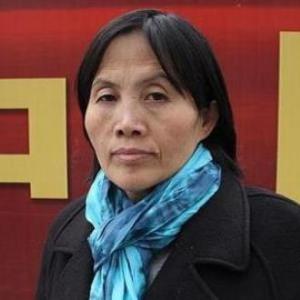On the one-year anniversary of her death, Human Rights in China remembers and honors Cao Shunli (曹顺利), a tireless advocate of government transparency and greater citizen participation in China’s human rights processes. Cao died in a Beijing hospital in March 2014 after six months in detention for “picking quarrels and provoking troubles” (寻衅滋事罪), during which time she was denied necessary treatment for her medical conditions. She was 52.
Cao, trained in law, dedicated herself to using China’s legal system to press for government accountability and for citizens’ rights to information, freedom of speech, and freedom of assembly. Her work signified the growth of China’s civil society where citizens are using the law and other peaceful means to fight for rights protected by the Chinese constitution and international law.
“Cao’s legacy, along with ongoing citizen activism, is a testament to the forces pressing for change in China,” said Sharon Hom, Executive Director of Human Rights in China. “It’s critical for the international community to recognize and support China’s citizens who are asserting their human rights, despite the Chinese government’s international efforts to raise the cultural relativism banner.”
Cao’s detention and tragic death coincided with a wave of government actions targeting civil society actors, most notably in the arrest, prosecution, and sentencing of New Citizens Movement activists who advocated for asset transparency and education equality. Government control over civil society space has only tightened in the year since Cao’s death. Chinese authorities have issued rules restricting information dissemination by the news media and on social media platforms; detained hundreds of individuals for lawful activities in connection with the 25th anniversary of June Fourth and those in support of the Occupy Movement in Hong Kong; prosecuted writers, journalists, public intellectuals, and lawyers on trumped up charges; shut down domestic civil society groups; and introduced legislation that would greatly curb the activities of some 6,000 foreign NGOs working in China.
The closing of the civil society space in China can most recently be seen in the criminal detention of five women’s rights activists: Li Tingting (李婷婷), also known as Li Maizi (李麦子), Wang Man (王曼), Wei Tingting (韦婷婷), Wu Rongrong (武嵘嵘), and Zheng Churan (郑楚然), also known as Datu (大兔). They have engaged in peaceful social activism previously tolerated by the Chinese authorities—raising awareness about a range of women’s rights issues, including gender inequality in employment and sexual harassment. The women have been accused of “picking quarrels and provoking troubles” (寻衅滋事罪), a charge regularly leveled against many citizen activists attempting to constructively address serious social concerns.
As we commemorate Cao and her legacy, we call on the international community to support the growing citizen activism and work to free the many citizen activists persecuted during this period of intensified crackdown for exercising their rights and working to expand the civil society space in China. Among them are:
